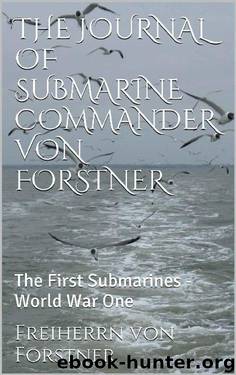The Journal of Submarine Commander von Forstner by Freiherrn von Forstner

Author:Freiherrn von Forstner [Forstner, Freiherrn von]
Language: eng
Format: epub
Publisher: Parsons Publishing Company
Published: 2014-02-07T05:00:00+00:00
Shaded area shows "War Zone" announced by Germany on 4 February 1915.
Our adversary was concealed by day, and only ventured forth at night, confident that darkness would insure his safety. This was then the hour for us to lie in watch for our prey, and no more glorious clarion call could have heralded in the New Year than the torpedo shot, which, on the New Year's Eve of 1915, sent the mighty ship of the line "Formidable" to the bottom of the Channel. This was our first triumphant victory, which showed that not even darkness could circumvent our plans, and which dispelled all further doubts as to our efficiency. A few days after the sinking of the "Formidable" a piece of one of the row boats was washed ashore at Zeebrugge, and now adorns our Sea Museum as the only reminder left of the great ship.
We stood at last on the same footing as our dear old sister, the torpedo boat, to whom we in reality owed our present development, and from now on, in proud independence, we were justified in considering ourselves a separate branch of the Navy.
Now that England felt obliged to withhold the activities of her fleet, she instigated against us the commercial blockade and hunger-war; she obliged neutrals to follow a prescribed route; and, by subjecting their vessels to search, she prevented them from selling us any of their wares. In this manner, she sought to redeem herself from the paralysis we had brought on her fleet, and her unscrupulous treatment of the right of nations and her interpretation of the so-called "freedom of the seas" are only too well known.
We retaliated on February 4, 1915, by prescribing a certain danger zone, which extended around Great Britain and Ireland and along the north coast of France. By this interdict, public opinion was enlightened as to the part our U-boats were going to perform in this new commercial warfare, a part, I must admit, that few people had anticipated before the commencement of hostilities. Of course, new demands were to be made upon us; we should have to make long undersea trips, and remain for some time in the enemy's waters, after which we should have to return unperceived. The English called it German bluff, but their tone soon changed after we had made our first raid in the heart of the Irish Channel, and few of them now ventured abroad except when forced by the most imperative obligations.
[For the first few months of the war, U-boat anti-commerce actions observed the "prize rules" of the time which governed the treatment of enemy civilian ships and their occupants. On 20 October 1914, SM U-17 sank the first merchant ship, the SS Glitra, off Norway.]
At the end of October, 1914, the first English steamer "Glitra" was sunk off the Norwegian coast. It carried a cargo of sewing machines, whisky, and steel from Leith. The captain was wise enough to stop at the first signal of the commander of the
Download
This site does not store any files on its server. We only index and link to content provided by other sites. Please contact the content providers to delete copyright contents if any and email us, we'll remove relevant links or contents immediately.
| Africa | Americas |
| Arctic & Antarctica | Asia |
| Australia & Oceania | Europe |
| Middle East | Russia |
| United States | World |
| Ancient Civilizations | Military |
| Historical Study & Educational Resources |
Room 212 by Kate Stewart(4125)
The Crown by Robert Lacey(4122)
Endurance: Shackleton's Incredible Voyage by Alfred Lansing(3863)
The Iron Duke by The Iron Duke(3659)
The Rape of Nanking by Iris Chang(3535)
Killing England by Bill O'Reilly(3470)
Joan of Arc by Mary Gordon(3275)
Say Nothing by Patrick Radden Keefe(3078)
I'll Give You the Sun by Jandy Nelson(2851)
Shadow of Night by Deborah Harkness(2750)
Hitler's Monsters by Eric Kurlander(2741)
Margaret Thatcher: The Autobiography by Thatcher Margaret(2692)
Mary, Queen of Scots, and the Murder of Lord Darnley by Alison Weir(2683)
Darkest Hour by Anthony McCarten(2656)
Blood and Sand by Alex Von Tunzelmann(2617)
Red Famine: Stalin's War on Ukraine by Anne Applebaum(2473)
Eleanor & Park by Rainbow Rowell(2402)
The One Memory of Flora Banks by Emily Barr(2358)
Book of Life by Deborah Harkness(2287)
